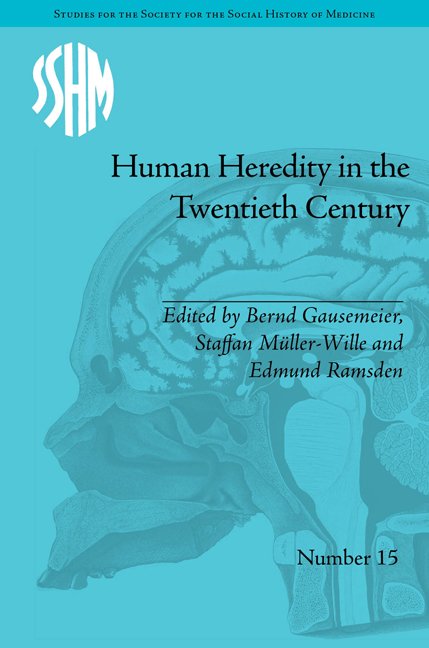Book contents
- Frontmatter
- Contents
- Acknowledgements
- List of Contributors
- List of Figures and Tables
- Introduction: Human Heredity in the Twentieth Century
- Part I Constructing Surveys of Heredity
- Part II Blood and Populations
- 4 From ‘Races’ to ‘Isolates’ and ‘Endogamous Communities’: Human Genetics and the Notion of Human Diversity in the 1950s
- 5 Between the Transfusion Services and Blood Group Research: Human Genetics in Britain during World War II
- 6 The Abandonment of Race: Researching Human Diversity in Switzerland, 1944–56
- 7 Post-War and Post-Revolution: Medical Genetics and Social Anthropology in Mexico, 1945–70
- Part III Human Heredity in the Laboratory
- Part IV Understanding and Managing Disease
- Part V Reconstructing Discipline(s)
- Notes
- Index
6 - The Abandonment of Race: Researching Human Diversity in Switzerland, 1944–56
from Part II - Blood and Populations
- Frontmatter
- Contents
- Acknowledgements
- List of Contributors
- List of Figures and Tables
- Introduction: Human Heredity in the Twentieth Century
- Part I Constructing Surveys of Heredity
- Part II Blood and Populations
- 4 From ‘Races’ to ‘Isolates’ and ‘Endogamous Communities’: Human Genetics and the Notion of Human Diversity in the 1950s
- 5 Between the Transfusion Services and Blood Group Research: Human Genetics in Britain during World War II
- 6 The Abandonment of Race: Researching Human Diversity in Switzerland, 1944–56
- 7 Post-War and Post-Revolution: Medical Genetics and Social Anthropology in Mexico, 1945–70
- Part III Human Heredity in the Laboratory
- Part IV Understanding and Managing Disease
- Part V Reconstructing Discipline(s)
- Notes
- Index
Summary
Race was a key concept in human genetic research during the first half of the twentieth century. It was especially important with regards to research on human diversity. From the Enlightenment, the biological diversity of humanity had been largely interpreted in terms of supposed racial differences. Historical research in the last decade has challenged the view that the history of racial research in the twentieth century should solely be read as the history of its decline. Rather, it revealed that the concept of race has proved astounding in its persistence in many respects. However, the concept of race appears to have lost much of its significance in interpreting human differences around the middle of the twentieth century, with new concepts and interpretations of human diversity gaining ground at the expense of the old racial classifications. The concept of race lost its function as a key epistemic category. How did this change come about?
The literature in the history of science offers two main explanations. The first ascribes a decisive role to politics. From this point of view, it was no longer considered appropriate after 1945 to continue using a scientific term that was so associated with the crimes of the Nazi regime.
- Type
- Chapter
- Information
- Human Heredity in the Twentieth Century , pp. 85 - 100Publisher: Pickering & ChattoFirst published in: 2014



